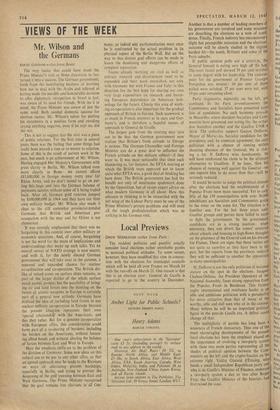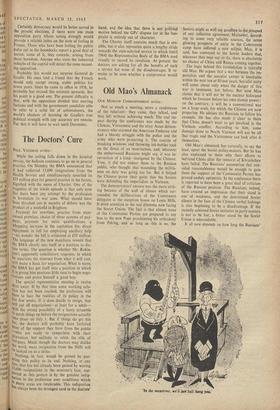Local Previews
DREW MIDDLETON writes from Paris :
The resident politicos and pundits usually consider local elections rather unreliable guides to national political attitudes. To some extent, however, they have modified this view in connec- tion with the elections for municipal councils which will be held all over France on March 14 with the run-offs on March 21. One reason is that this is an election year: General de Gaulle is expected to go to the country in December. Another is that a number of leading members of his government are involved and some ministers are describing the elections as a vote of cog. dence. Finally, French industry has encountered s slight but perceptible recession and the elections outcome will be closely studied in the regions hardest hit—the north. Brittany and some of the Paris suburbs.
If public opinion polls are a criteri,in, the General himself is eating very high off the hog. The most recent poll showed 59 per cent' satisfied to some degree with his leadership. The endorse. ment for the government of Premier Georges Pompidou was weaker: 44 per cent of those polled were satisfied, 37 per cent were not, with 19 per cent remaining silent.
Party alignments, especially on the left, are contused. In the Paris arrondissements the Communists and Socialists have presented joint lists of candidates. No such harmony prevails in Marseilles where dissident Socialists and Com- munists have presented one voting list, the ortho- dox Socialists another and the Gaullist UNR a third. The orthodox support Gaston Defferre, Mayor of Marse'aes. Socialist candidate for the presidency and, by common agreement, the only politician with a chance of coming within shouting distance of the General. He is risk- ing a lot. If Defferre wins handsomely, he will have reinforced his claim to be the ultimate alternative to Gaullism. If he loses, then his chances of running well against the General no one expects him to do more than that—will be seriously reduced.
It would be easier to judge the political climate after the elections had the establishment of a Popular Front been more successful. Yet in only fifty of the 159 municipalities with over 30.000 inhabitants are Socialists and Communists going to the voter on the same list. The situation is 3 familiar one. For the last three years anti' Gaullist groups and parties have failed to unite to fight the government. So the government candidates are in a strong 'position: when necessary, they can divert the voters' anxieties about schools and housing to high-flown thoughts on the greatness of the General and on his dreams for France. There are signs that these tactics are not quite so sure-fire as they have been in the past, but the reports from the provinces indicate they will be sufficient to smother the oppositio0 in many municipalities.
M. Defferre is not the only politician of national stature on the spot in the elections. Jacques Chaban-Delmas, the President (Speaker) of the National Assembly, faces strong opposition frorn the Popular. Front in Bordeaux. This former rugby international and resistance leader is an able and ambitious politician with a personality far more attractive than that of many of the worthy, able and dull men who sit in the cabinet. Many believe he will be an important political figure in the post-de Gaulle era. A defeat could change all that.
The multiplicity of parties has long been a weakness of French democracy. Thus one of the most encouraging developments of the present local elections has been the emphasis placed on the importance of evolving a two-party system with these two main parties representing all the shades of political opinion between the Com- munists on the left and the crypto:fascists on the extreme right. Valery Giscard d'Estaing, who heads a small Independent Republican party and whq is de Gaulle's Minister of Finance, endorsed a two-party system a day or two after Roger Frey, the Gaullist Minister of the Interior, had first raised the issue.
Certainly democracy would be better served in the present elections, if there were one main opposition party whose voting strength would provide a reliable index on the state of feeling in France. Those who have been feeling the public Pulse out in the boondocks report a good deal of unrest, some of it, they concede, arising from sheer boredom. Anyone who visits the industrial suburbs of the capital will detect the same mount- ing opposition.
Probably this would not surprise General de Gaulle. He once told a friend that the French would only accept strong, stable politics for seven years. Since he came to office in 1958, he Probably has revised this estimate upwards. But his point is a good one. The present difficulty is that, with the opposition divided into warring factions and with the government candidate able to refer to a solid list of achievements, the world's chances of learning de Gaulle's true Political strength with any accuracy are remote. For this it will have to wait until December.



































 Previous page
Previous page